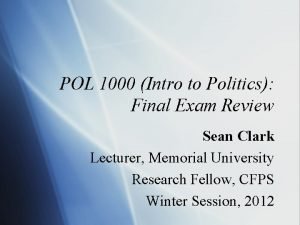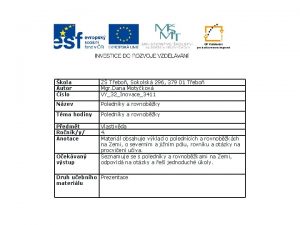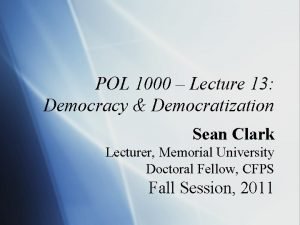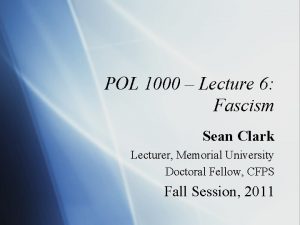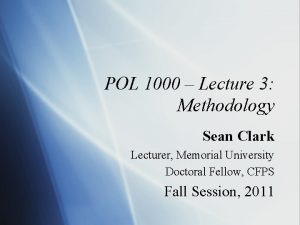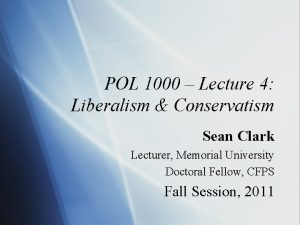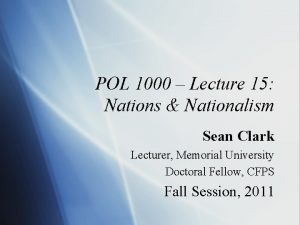POL 1000 Lecture 12 StateSociety Relations Sean Clark








- Slides: 8

POL 1000 – Lecture 12: State-Society Relations Sean Clark Lecturer, Memorial University Doctoral Fellow, CFPS Fall Semester, 2011

Lecture Arc § 1. Pluralism. § Classical. § Neo-Pluralism. § 2. Corporatism. § State Corporatism. § Neo-Corporatism. § 3. Consociational Democracy. § 4. Civil Society.

State-Society Relations § Nature of relations btn state & society vary from one political system to the next. § State can have more or less involvement in daily public life. § How closely does ‘Big Brother’ watch you? § Some ideologies prefer more of the former. Others desire less. § Can create a typology (pluralism, corporatism, & consociationalism) according to: § 1. the intensity of competition in the political arena. § Is politics cooperative (Norway), or more competitive (India)? § 2. the manner in which interest groups are founded & organized to represent the interests of their constituencies. § Who creates groups? How easy is it to do so? How do they work? § USSR: protest movements banned. Germany: no anti-democrats permitted.

Pluralism § Argmt (i. e. Madison 1788, Bentley 1908, Truman ‘ 58): is best when power is not monopolized. § § Protects vs tyranny of majority or privileged. Method: permit open, unrestrained competition btn different interest groups (state is impartial referee). § § Even playing field = everyone has a shot. Winning groups get to drive govt policy. Shifting alliances mean entrenched elite kept from being formed. § As popularity of interest changes (climate change today, energy tomorrow), so too the relative strength of its associated interest group. § Not everyone agrees on everything. Is a normative preference: competition is seen as good, something to be encouraged. § Ie US, Canada, UK: we want different interest groups to battle it out. § ‘ 60 s & Neopluralism. § I. e. Dahl, Galbraith: wait! Some groups are more equal than others. § People need jobs, thus MNCs treated more favourably than Sierra Club. § Critics abound: § Again, what is competition is neither free nor open? What happens to the weak & their ints? How move weathervane then? § What if competition itself is wasteful, harmful, prone to abuse? § Strikes, advertisements, heated political campaigns all do little to improve the nation.

Corporatism § Schmitter (‘ 74): interest groups are bound together, by function (i. e. all labour groups in one body), in noncompetitive hierarchy. § Generally ordered into ‘peak associations’ of govt, business, & labour. § Deals made at top (bargain here, rather than on street) are filtered down below. § I. e. Japanese govt, exporters, & unions. § Aim: boost efficiency thru cooperation, rather than competition. § Free markets seen as destructive & wasteful (spend time competing, i. e. tv ads, rather than innovating). § State Corporatism: groups have no choice. § Template for corporate hierarchy is the army. § Mussolini (22 ‘corporations’ to run entire economy), Hitler, Assad: politics & economics brought together by force. § Even more, sought to control private, social life as well (i. e. Hitler Youth, Soviet sports leagues, etc). § Failures of ‘ 40 s overshadow successes of ‘ 30 s. § Neo-Corporatism (‘societal’): softer, more bargaining. Generally limited to econ affairs. § Post-war: little desire for state involvement in social affairs. § Even so, when economy is bad, pressure for govt to diminish competition is common. § ‘ 70 s: trade & free market worries = growth in popularity (‘can protect us from the ravages of capitalism’). § Need to avoid job off-shoring & race-to-the-bottom wage spirals w ‘iron triangles’. § I. e. Bayern govt, Quandt family, & unions all sit on BMW board. § Back today (i. e. AIG, GM bailouts, bc of risk-taking unbridled competition fosters)? § Danger is sclerosis & corruption (i. e. Siemens). Govts good at running businesses? § § Similarly, when leaders make decisions for everyone, is incentive to pursue own interest, rather than the group’s. I. e. Siemens: payments to union leader to reduce wage demands. § Lesson: popularity generally reflects social & economic circumstances. § Still, some political cultures are more amenable (i. e. demanding) than others. § US, Canada, UK on one end; Sweden & France on the other.

Consociational Democracy § Some countries (i. e. Belgium--language, Switzerland--ethnicity, Austria-religion) torn by deep divisions. § Lijphart: overcome this thru political instxns which enhance cooperation & accommodation (rather than simple majorities). § Can even have pluralist economics at the same time (though often goes hand-in-hand w neocorporatist economics). § These consensus-building mechanisms include: § § Coalition govts: bring in minority parties. Mutual veto: give minority groups right to torpedo legislation affecting them. Proportionality: use a PR electoral system to broaden representation. Segmental Autonomy: give minority groups exclusive rights over their own affairs. § Most commonly run own language, religion, & schools. Also HK & China. § Thus in UK, majority winner (even if need coalition) takes all. Vs. in Switzerland, every group gets to share in governing. § Is a third way of doing things (i. e. btn pluralist & corporatist extremes). § Want groups to freely mobilize, yet not about winner-take-all. § Prob: again, what if accommodation comes at expense of national viability? § Plus, not stop conflict (i. e. Lebanon)--& vetoes can = deadlock (Belgium waits months for new govt).

Civil Society § We spend a lot of time thinking about structures of govt. But have only recently returned to idea of just how important private groups are. § In many ways, what private citizens do--& the interest groups they form—are just as important as the govts that rule them. § Private association is fuel of democracy (can be no liberty w/o public vibrancy). § Without private association there can be no democracy, no check on predatory power of the state, no pursuit of interests outside the govt’s. § Govts care more about prisoners when Amnesty around. § Includes trade unions, professional syndicates, parties, NGOs, charities, & clubs. § Now a trans-national component as well. § Diamond, Linz, & Lipste ’ 95: is also a matter of training/improving pol skills of the public (p 28). § Work of private groups made vastly easier when operate in climate of tolerance & mutual legitimacy (de Tocqueville, Putnam). § ‘Social capital’ (trust in instxns & others) makes it easier to cooperate. § Empirical evidence: ‘civil culture’ (lots of trust in instxns & others, political engagement, etc) generally coincides w political stability & affluence. § Even when deferential in politics (i. e. Singapore), social trust can bind a society together. § Prob: how operationalize? How graph? How boost its production? § Is not easy to graph ‘trust’. Feelings are not numbers. § How build society when it does not exist (i. e. religious mistrust in Iraq, ethnic in Afghanistan)?

